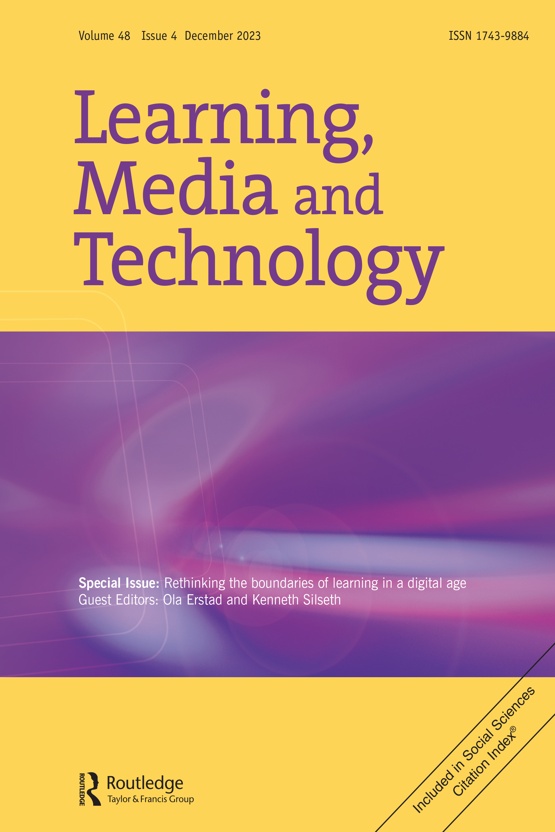Submit a Manuscript to the Journal
Learning, Media and Technology
For a Special Issue on
Transforming methodologies: reconsidering the tools and logics of educational research in the digital era
Abstract deadline
30 November 2023
Manuscript deadline
30 June 2024

Special Issue Editor(s)
Michael Geiss,
Zurich University of Teacher Education
[email protected]
Kenneth Horvath,
Zurich University of Teacher Education
[email protected]
Tobias Röhl,
Zurich University of Teacher Education
[email protected]
Simona Szakács-Behling,
Helmut-Schmidt University Hamburg
[email protected]
Transforming methodologies: reconsidering the tools and logics of educational research in the digital era
This special issue aims to deepen our understanding of the methodological implications of the digital transformation for educational research. More than fifteen years after Savage and Burrows (2007) have warned of the “coming crisis of empirical sociology”, we still have a limited understanding of these implications. That is all the more true for the transdisciplinary and multimethodological contexts of educational research with its strong entanglement of research, practice, and politics.
What seems clear is that the tools and logics of social research are undergoing profound and manifold developments. Researchers need to consider new sorts of data and material, employ novel analytical techniques, confront new sources and conceptions of knowledge, share their questions and findings in completely new ways, and organize research activities in changing social contexts marked by epistemic agency of different kinds of actors. Methodologically, researchers have to design and employ methods that reflect new social realities without losing analytical rigour, while also acknowledging how their methods co-create the empirical reality they analyse in a time where digital infrastructures are deeply ingrained in society (Ruppert, Law, and Savage 2013, Macgilchrist 2021). At the same time, the rise of novel non-academic forms of large-scale data production and analysis entails both new arrangements of knowledge ownership and new standards of assessing the “quality” of knowledge claims. While calling into question canonical approaches, these ruptures also hold promises, for example regarding new perspectives for overcoming divides between quantitative and qualitative methods (Venturini and Latour 2010).
Confronting these issues offers not only insights into key methodological challenges for the social sciences and humanities but also promises new perspectives on education as a field of practice. Both education and educational research are then no longer seen as simply being affected by the digital transformation but rather as themselves always already involved in the process of technological change. What is learned and how it is learned has become itself tied to digital data, through the increasing datafication of education research (Williamson 2017; Jarke and Breiter 2020). The field of education – teaching and learning in all its varieties – appears in this context as a largely unexplored, yet exemplary field for critically examining the impact of digital transformation on social research epistemologies and practices.
But how exactly does education as a research field change in light of new forms of data and analytics, and the (often implicit) methodologies underlying them? What are the implications of the digital transformation for the tools and logics we use for research into these dynamics? And how should we understand and define the role of researchers vis-à-vis developments that change both their object of inquiry and their field of practice?
We invite papers that further our understanding of these and related questions. Possible topics include, but are not limited to:
- Changing political economies of social research and their methodological consequences
- Affordances and challenges of employing digital methods and methodologies during times of crises, change and transformation
- Methodological innovations transgressing established divides (macro/micro, quantitative-qualitative etc.)
- Showcases of computational social science methods
- Reconfigurations of actors and networks involved in social research
- Epistemologies of data and algorithms
Looking to Publish your Research?
Find out how to publish your research open access with Taylor & Francis Group.
Choose open accessSubmission Instructions
Interested authors should submit an abstract of around 300 to 500 words by email to [email protected] and [email protected] by 30 November 2023. The abstract needs to be clearly aligned with the Aims and Scope of Learning, Media and Technology.
Invitations to submit a full manuscript will be sent by 22 December 2023. Full manuscripts (between 6,000 and 8,000 words) are due 30 June 2024. All submitted papers will be subject to the journal’s usual double-blind review process.
Please remember to select the special issue title (“Transforming methodologies: reconsidering the tools and logics of educational research in the digital era”) when submitting your full manuscript through ScholarOne.
Given the timeliness of this topic, accepted papers will be published online first prior to publication of the Special Issue.